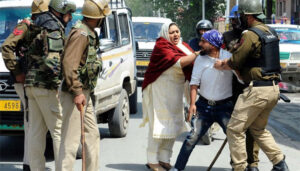
Md Jubair: A UK-based law firm Stoke White Investigation (SWI) has launched a report highlighting India’s subversive activities of suppressing media in IIOJK. The report was published by Legal Forum for Kashmir and Stoke White Lawyers titled, “India Silencing Journalism and Human Rights in Kashmir.”
The authors of the SWI report, Khalil Dewan and Nasir Qadri highlighted how India uses its legal system, especially its “disingenuous application” of counter-terrorism strategy, to criminalize critical reporting and matters that are normally seen as part of free speech in democratic countries elsewhere. “
India’s treatment of human rights defenders and journalists is an extension of its counter-insurgency strategy – disrupt, detain and punish.” SWI has compiled at least 2000 testimonies of Kashmiris between 2020-2021.
The individual accounts accuse India of various crimes, including extrajudicial killings, enforced disappearances, kidnapping, torture and sexual violence. SWI has documented more than 2,000 cases – all of serious nature.
The most glaring ones included 450 cases of torture, 1500 victims of pellet gun shootings, 100 enforced disappearances and 30 accounts of sexual violence. On 5th August 2019, BJP-led government revoked nominal autonomy of Jammu and Kashmir amidst a military curfew, internet shutdown and media gag in the territory.
For India, the move was necessary as it claimed the special status hindered economic development and had become a “root-cause of terrorism” in the region. SWI said, India’s “culture of impunity” has shielded all the accused from facing the court of law.
The report added, “Nearly three decades have passed and not a single member of the Indian military has been prosecuted for unlawful conduct in J&K, despite growing evidence against the armed forces.
To make matters worse, the police as well as Indian army prevent victims from reporting crimes committed by their personnel to the local police station. New Delhi-led administration in Jammu and Kashmir passed a slew of measures under its new “Media Policy” to control and monitor journalism in the troubled region.
According to SWI, the new media policy is aimed at cultivating a new breed of journalists who do not “propagate any information prejudicial to the sovereignty and integrity of India”. In the medium to long-term, this could develop into a social engineering programme/policy to re-organize and nurture journalism and the reporting industry to reflect an engineered ‘positive’ image of the Indian authorities.





